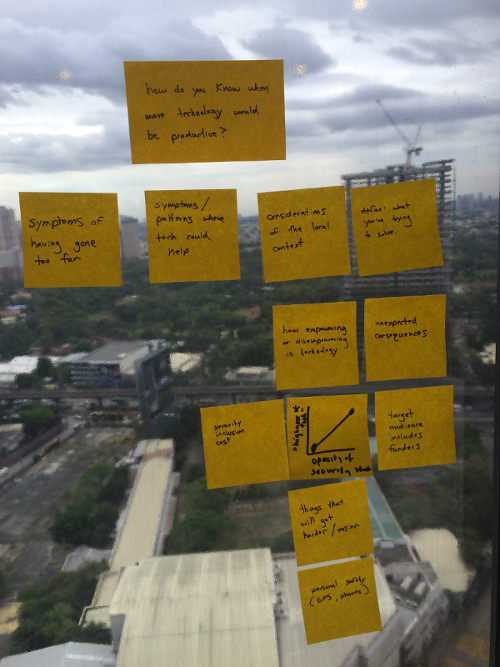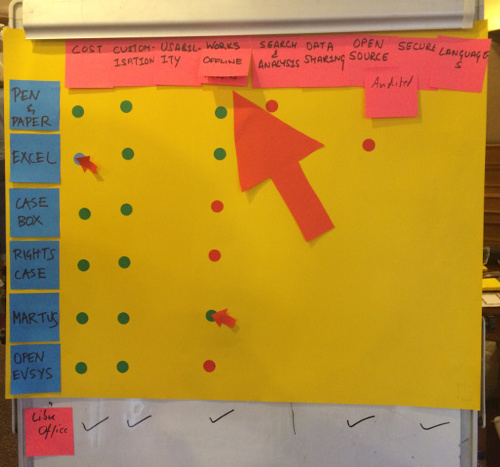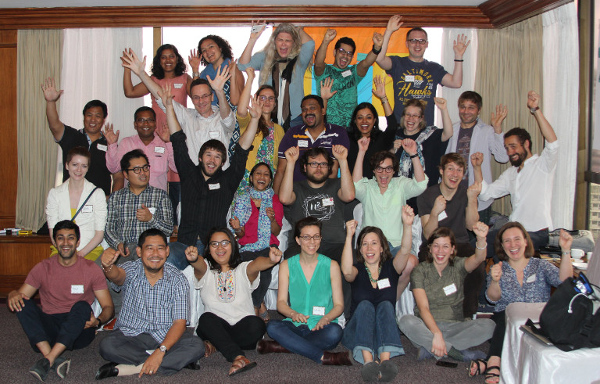Documenting human rights violations depends on data. Photos of survivors. Recorded first hand accounts of atrocities. Emails and financial documents from the perpetrators. These materials are all data-driven, and this documentation is essential to the protection of human rights. But if this data is not handled carefully, it can compromise the safety of the people who create, collect, or use it.

The Responsible Data Forum, held in Manila on March 21 and 22, 2015, brought together human rights defenders, technologists, and trainers from around the world to foster responsible data practices for human rights documentation. This was the eighth Responsible Data Forum held by the engine room, an organization that supports and investigates the use of technology and data in advocacy work.
In Manila, I joined small working groups to explore topics such as how to identify appropriate tools and best practices for verifying human rights documentation. I worked with an incredible group of people to explore the challenges of working in low technology environments. We designed our conversation to help funders and developers think through the question of, "Will it be productive to bring technology to a low tech situation?"
The complex role of translators often came up in conversations. In a country like the Philippines, where local languages are diverse and distributed, collecting accounts of human rights abuses can prove difficult. An account may have to be translated from a local dialect, to Tagalog, and then into English before being reported by an international media organization, and this requires networks of volunteer translators who can navigate these languages effectively. These volunteer translators may not have much better access to technology than the people whose stories they're transcribing, so documenters can not take Internet, mobile access, or even continuous electrification for granted when planning a documentation project.
Getting three dozen people to the Philippines was a logistical challenge, but a great opportunity to compare contexts. One person working with gender violence in the Democratic Republic of Congo and another working to end human disappearances in the Philippines started a discussion on the role of frontline government staff in human rights. The former works with doctors and police to document incidents of physical abuse and implement protective policies. The latter works in situations where the frontline of government is part of the problem, complicit in systemic violence or denying services to certain groups. "Government" and "frontline responders" play very different roles in these and other situations, and people supplying technology or hoping to intervene can not take these groups or their motivations for granted.

Later, I discussed the varying roles for journalists with Wael Eskandar, a journalist based in Cairo. Whether through blogs, social media, radio, or very small scaled print, community journalists tell local stories in the local language, but their limited technology and capital prevents their words from spreading very far. The few journalists supported by professional organizations have funding, political capital, and training to ensure they can operate as safely as possible. However, as traditional news organizations are forced to downsize, it is much more common to see freelance journalists operating with the same information and physical risks, but none of the security and only some of the technical access of a professional media affiliation.
The engine room convened a fantastic group of folks from both the Philippines and around the globe in March. We were thankful to be part of the organizing team along with Huridocs, Amnesty International, and Benetech. I thoroughly enjoyed meeting these people doing incredibly important work, and appreciated their taking the time to share their challenges and goals. Human rights documentation is important work, and we salute the collaborative efforts to assure that it is done responsibly. Many thanks also to Kristin, Alix, and Christopher of the engine room and Freidhelm of Huridocs for the opportunity to listen.


